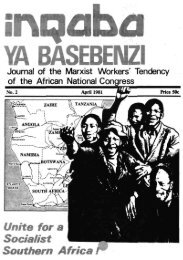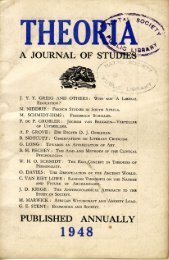Staffrider Vol.5 No.2 1982 - DISA
Staffrider Vol.5 No.2 1982 - DISA
Staffrider Vol.5 No.2 1982 - DISA
You also want an ePaper? Increase the reach of your titles
YUMPU automatically turns print PDFs into web optimized ePapers that Google loves.
into the dirt. Joel was different from<br />
the others. To the ten year old Sarah,<br />
differences were intolerable, She<br />
dashed away before he could restrain<br />
her.<br />
When Joel looked again, the airplane<br />
had gone. He threw the metal<br />
part away from him and watched it<br />
fly, but not fly. It clanged up noisily<br />
against one of the garbage trucks that<br />
littered the hill-top. The driver yelled<br />
and waved his fist at the boy. Joel<br />
swore eloquently in return.<br />
For ten years, the trucks had<br />
brought rubbish and soil to this spot<br />
of empty ground across the road from<br />
the airport. And for ten years, while<br />
tractors shaped the collected garbage<br />
into a large plateau, blacks from<br />
Nyanga, and Guguletu, and Crossroads<br />
had made their living from the<br />
refuse of Cape Town. Officially, this<br />
was not allowed. But officialdom<br />
pretended not to notice, and those<br />
disinherited members of South African<br />
society were permitted the grace to<br />
live like rats in the garbage. The<br />
system, like a magician, took away<br />
with one hand, and fed secretly with<br />
the other. It was a degrading meal.<br />
Joel knew somehow, although no one<br />
had ever explained it to him, that<br />
something was wrong with a situation<br />
in which some people flew, while<br />
others grovelled in the muck. Sarah<br />
could not see it, although she and Joel<br />
were of the same age. Maybe realizations<br />
like this come only to certain<br />
people, and then irrespective of age.<br />
Joel wanted to fly. He wanted so<br />
badly to fly that his desire was like<br />
a monumental tingling itch somewhere<br />
inside his chest. He could<br />
not reach to scratch it; it sometimes<br />
left him breathless and choking. He<br />
swore in frustrated anger at the black<br />
truck driver who helped to make the<br />
system work.<br />
Harold Dube looked up from his<br />
labours and laughed hugely at Joel's<br />
outburst. Harold's self-appointed<br />
function was to chip cement off the<br />
borders of the waste bricks that<br />
he found. A neat stack of bricks<br />
stood like a wall beside him. Nasrudin<br />
would pay a few rand for the hoard.<br />
'Hey kid, you tell him to fok off,<br />
the blerrie skollie,' shouted Harold and<br />
playfully lobbed a bit of cement in the<br />
direction of the lorry. The driver<br />
raised his fingers in a rude gesture and<br />
grinned. Then he drove his truck<br />
forward, close to the edge of the<br />
plateau, and tipped out its load.<br />
Immediately a horde of children and<br />
adolescents all as ragged and ragamuffinish<br />
as Sarah, converged on the pile,<br />
dismembering its neat, mound shape,<br />
and retrieved an assortment of torn<br />
clothes, cardboard, bits of metal, and<br />
In a hierarchy of scavengers,<br />
Nasrudin was the primal scavenger<br />
and Joel hated him. The trader's<br />
coat was always spotlessly white;<br />
the only sullying c?me from<br />
reaching into his top pocket<br />
to get at the bundle or notes<br />
with which he paid his collectors.<br />
one or two abandoned teddy-bears and<br />
toy dogs, all reeking and filthy. The<br />
driver gave the thumbs-up sign and<br />
turned his truck back toward the exit.<br />
On the cab door a notice said:<br />
'Administration Board, Western Cape'.<br />
But the words meant nothing to Joel<br />
as he could not read. Already the next<br />
lorry was preparing to dump and<br />
behind it was another and another,<br />
like bullets ready to enter the chamber<br />
of a gun.<br />
The noise of the machines rose and<br />
receded, as gears were engaged, as<br />
accelerators were depressed, as the<br />
activities of the Guguletu Refuse<br />
Dump were conducted. The hill<br />
shuddered underfoot as the caterpillar<br />
tractor ground by on its business of<br />
pushing the offal over the precipice. A<br />
few daring souls dashed across the face<br />
of the tractor's scoop, rescuing bits of<br />
what someone else had discarded,<br />
while a fair-sized crowd waited three<br />
meters below to recover the falling<br />
bounty.<br />
Nasrudin was down there as well,<br />
negotiating deals. The Indian had a<br />
permit issued to him by the Bantu<br />
Administration Board to collect<br />
refuse. This he did, although not<br />
personally. The refuse was, in fact,<br />
brought to him, cleaned, bundled, and<br />
stacked by the people of the dump. In<br />
a hierarchy of scavengers, Nasrudin<br />
was the primal scavenger and Joel<br />
hated him. The trader's coat was<br />
always spotlessly white; the only<br />
sullying came from reaching into his<br />
top pocket to get at the bundle of<br />
notes with which he paid his collectors.<br />
On and around the plateau hundreds<br />
of squalid people played or worked<br />
conscientiously, or just milled about<br />
with no apparent aim, waiting for<br />
something to happen. The old man<br />
with the squint sat in his usual corner,<br />
hammering nails from a chair leg. His<br />
barrow was full of wood. Despite the<br />
squint the old man's aim was unerring.<br />
Joel had often watched him work,<br />
secretly hoping he would miss the nail<br />
and hit his finger. But the old man<br />
never missed.<br />
As Joel ran back over the plateau to<br />
find his mother he passed the old<br />
carpenter. Near to the old man the<br />
shell of a washing machine stood unattended;<br />
it was filled incongruously<br />
with loaves of bread wrapped in clear<br />
plastic and visible through the circular<br />
frontal opening. Joel was tempted to<br />
investigate more closely, but he knew<br />
that possessive eyes watched over the<br />
food, and that the possessors of those<br />
eyes were adept with a knife, and<br />
callous, even eager enough to use it.<br />
He avoided the trap and ran on.<br />
After a while he came to a group<br />
of women sitting around a fire that<br />
had been made close to the place<br />
where the plateau began. A heavy<br />
plastic bag half-filled with sheep's<br />
trotters gaped obscenely at the boy.<br />
The women dipped into the bag<br />
randomly; they were cooking the<br />
woolly stumps on a grid that straddled<br />
the small fire. Joel's mother was<br />
amongst the group.<br />
'Where did you get that?' asked<br />
Joel pointing at the plastic bag.<br />
No one knew that she had<br />
slept with the butcher. How else<br />
did one get enough to eat? Not<br />
even her husband knew. She hid<br />
her affair well; he would not<br />
understand.<br />
'It was a present from Gamat the<br />
butcher,' said Maria Gweba. She<br />
always smiled at the world. If you did<br />
not know her, you would not have<br />
guessed the heart-ache she had<br />
suffered. For, even though her breasts<br />
had nourished two children, only<br />
lone survived. Anthony, the elder, had<br />
been shot dead by the police during<br />
the riots of 1976.<br />
'He fancies you,' joked Althea<br />
Plaatjies, and nudged Maria with her<br />
elbow. Maria blushed and reached into<br />
the bag. She took out a leg and put it<br />
on the grid.<br />
'Ag nee,' she protested, although it<br />
was true. No one knew that she had<br />
slept with the butcher. How else did<br />
one get enough to eat? Not even her<br />
husband knew. She hid her affair well;<br />
he would not understand.<br />
The cooked and charred results of<br />
the braai were laid out in ordered<br />
rows on a blanket. Joel took one<br />
blackened stick and gnawed on the<br />
meat, spitting out the fluff.<br />
'Did you see the man-bird?' he<br />
asked, using a word he had made<br />
up. Some of the women in the circle<br />
looked at him curiously. Maria<br />
shrugged. She knew that Joel was<br />
special; he thought of things that no<br />
one else thought about. Anthony had<br />
been like that as well. This was Maria's<br />
lot: to bring special children into the<br />
world. She wished that her children<br />
could have been ordinary. There was<br />
no place for special children on the<br />
Guguletu Refuse Dump.<br />
From where the women had<br />
gathered it was possible to see the<br />
STAFFRIDER, VOL. 5 NO. 2, <strong>1982</strong> 3
















